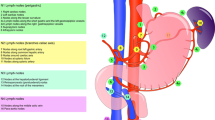Abstract
Much debate still exists regarding the appropriate extent of lymphadenectomy for gastric adenocarcinoma. In high incidence countries in Eastern Asia, more extensive (e.g. D2) lymphadenectomies are standard, and these surgeries are generally done by experienced surgeons with low morbidity (<20 %) and mortality (<1 %). In United States and Western Europe, where the incidence of gastric adenocarcinoma is much lower, the majority of patients are treated at non-referral centers with less extensive (e.g. D1 or D0) lymphadenectomy. This symposium article first reviews early studies that led to recommendations for less extensive lymphadenectomy. Two large prospective, randomized trials performed in the United Kingdom and the Netherlands in the 1990s failed to demonstrate a survival benefit of D2 over D1 lymphadenectomy, but these trials have been criticized for inadequate surgical training and high surgical morbidity (43–46 %) and high mortality rates (10–13 %) in the D2 group. We then discuss more contemporary studies that support more extensive lymphadenectomy with a minimum of 16 lymph nodes for adequate staging. The 15-year follow-up of the Netherlands trial now demonstrates an improved disease-specific survival and locoregional recurrence in the D2 group. A prospective, randomized trial from Taiwan found a survival benefit of more extensive lymphadenectomies, and another randomized trial from Japan found adding dissection of para-aortic nodes to a D2 lymphadenectomy did not improve survival. Western surgeons have increasingly accepted the importance of performing more than a D1 node dissection, and Eastern surgeons are accepting that more than a D2 node dissection does not improve survival and increases morbidity. Thus both Eastern and Western approaches are favoring D2 lymphadenectomy as a standard, and on this topic we appear to be harmonizing.

Similar content being viewed by others
References
Jemal A, Bray F, Center MM et al (2011) Global cancer statistics. CA Cancer J Clin 61:69–90
Siegel R, Naishadham D, Jemal A (2012) Cancer statistics, 2012. CA Cancer J Clin 62:10–29
Japanese Research Society for Gastric Cancer (1973) The general rules for the gastric cancer study in surgery. Jpn J Surg 3:61
Japanese Gastric Cancer Association (2011) Japanese classification of gastric carcinoma: 3rd English edition. Gastric Cancer 14:101–112
Nishi M, Omori Y, Miwa K (1995) Japanese classification of gastric carcinoma. Kanehara & Co., Ltd, Tokyo
Japanese Gastric Cancer Association (2011) Japanese gastric cancer treatment guidelines 2010 (ver. 3). Gastric Cancer 14:113–123
Bonenkamp JJ, Songun I, Hermans J et al (1995) Randomised comparison of morbidity after D1 and D2 dissection for gastric cancer in 996 Dutch patients. Lancet 345(8952):745–748
Cuschieri A, Weeden S, Fielding J et al (1999) Patient survival after D1 and D2 resections for gastric cancer: long-term results of the MRC randomized surgical trial. Surgical Co-operative Group. Br J Cancer 79:1522–1530
Maruyama K, Sasako M, Kinoshita T et al (1995) Pancreas-preserving total gastrectomy for proximal gastric cancer. World J Surg 19:532–536. doi:10.1007/BF00294714
Uyama I, Ogiwara H, Takahara T et al (1996) Spleen- and pancreas-preserving total gastrectomy with superextended lymphadenectomy including dissection of the para-aortic lymph nodes for gastric cancer. J Surg Oncol 63:268–270
Biffi R, Chiappa A, Luca F et al (2006) Extended lymph node dissection without routine spleno-pancreatectomy for treatment of gastric cancer: low morbidity and mortality rates in a single center series of 250 patients. J Surg Oncol 93:394–400
Wu CW, Hsiung CA, Lo SS et al (2006) Nodal dissection for patients with gastric cancer: a randomised controlled trial. Lancet Oncol 7:309–315
Songun I, Putter H, Kranenbarg EM et al (2010) Surgical treatment of gastric cancer: 15-year follow-up results of the randomised nationwide Dutch D1D2 trial. Lancet Oncol 11:439–449
Sasako M, Sano T, Yamamoto S et al (2008) D2 lymphadenectomy alone or with para-aortic nodal dissection for gastric cancer. N Engl J Med 359:453–462
Degiuli M, Sasako M, Ponti A et al (1998) Morbidity and mortality after D2 gastrectomy for gastric cancer: results of the Italian Gastric Cancer Study Group prospective multicenter surgical study. J Clin Oncol 16:1490–1493
Degiuli M, Sasako M, Calgaro M et al (2004) Morbidity and mortality after D1 and D2 gastrectomy for cancer: interim analysis of the Italian Gastric Cancer Study Group (IGCSG) randomised surgical trial. Eur J Surg Oncol 30:303–308
Degiuli M, Sasako M, Ponti A (2010) Morbidity and mortality in the Italian Gastric Cancer Study Group randomized clinical trial of D1 versus D2 resection for gastric cancer. Br J Surg 97:643–649
D’Angelica M, Gonen M, Brennan MF et al (2004) Patterns of initial recurrence in completely resected gastric adenocarcinoma. Ann Surg 240:808–816
Schmidt B, Chang KK, Maduekwe UN et al. (2013) D2 lymphadenectomy with surgical ex vivo dissection into node stations for gastric adenocarcinoma can be performed safely in Western patients and ensures optimal staging. Ann Surg Oncol (in press)
Karpeh MS Jr (2005) Should gastric cancer surgery be performed in community hospitals? Semin Oncol 32(6 Suppl 9):S94–S96
Conflict of interest
None
Author information
Authors and Affiliations
Corresponding author
Rights and permissions
About this article
Cite this article
Strong, V.E., Yoon, S.S. Extended Lymphadenectomy in Gastric Cancer Is Debatable. World J Surg 37, 1773–1777 (2013). https://doi.org/10.1007/s00268-013-2070-1
Published:
Issue Date:
DOI: https://doi.org/10.1007/s00268-013-2070-1




